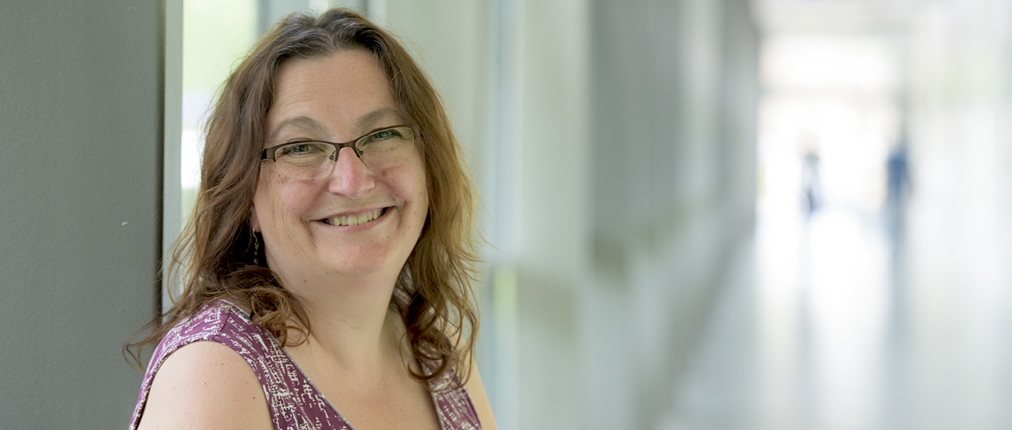Hartley News Online Your alumni and supporter magazine
Philippa Reed is Professor of Structural Materials in Engineering and the Environment, and Head of Engineering Sciences. For our diversity issue, Philippa recalls her career and the experiences that have led to the position she is in today.
I went to an all-girls school, and I think it’s a fairly classic story that at an all-girls school there isn’t any particular gender assignation to subjects. As such, I did maths, physics and chemistry at A-Level, which may have been considered more ‘male’ subjects in a mixed school. It was a bit of a surprise to everybody (including me) when following this, I got into Cambridge.
I found myself in a very supportive all-female environment in my college, but in lectures this was not the gender balance; as men outnumbered women significantly.
I initially thought I was going to become a chemical engineer, but ended up switching paths. This was partly because I was one of only three girls in the fluid mechanics class of about 150 in total, and being female felt a little bit like being bright green. After switching to studying materials, by my third year, women made up approximately 20 per cent of the cohort. Suddenly, I felt much less as though I was in a minority, and I hope these sorts of numbers can be achieved at Southampton; we still only have about 10 per cent women in mechanical engineering at undergraduate level here and 20 per cent seems to me to be some sort of critical mass threshold. After my degree, I found myself attending job interviews for things I really wasn’t interested in (unsurprisingly I didn’t get many job offers from those interviews), and my tutors at Cambridge instead found me an industrially funded PhD with Rolls-Royce and Associates working on failure processes in nuclear reactor pressure vessel welds. I also went on to undertake post-doctoral research at Cambridge looking at fatigue in single crystals.
In an appraisal during my postdoc period I once told a senior academic that one of the reasons I wanted to be an academic is because I felt it would be a good way to combine work with family life. His response was “I hadn’t thought of that, I suppose that must be quite difficult mustn’t it?” which looking back is pretty telling; it just wasn’t something that people thought about in the way they do now. He recommended to me at that time that it would be better for me to move away from Cambridge, and to develop my expertise somewhere else, so I wrote a fellowship proposal to move to Oxford and to further my characterisation expertise in materials, got an interview and was accepted. That all sounds incredibly easy, but the fact of the matter was that this was one of about 15 fellowship proposals I had written, where I didn’t get interviews; I had to learn to be quite thick skinned to rejection. Three days after I arrived at Oxford, I was offered the job at Southampton, where I joined a tiny sub-department in engineering materials, where there were only three members of staff. Nowadays we number more like 15 academics in the group. My work still focuses on failure processes in a range of engineering materials, but I have had to be quite flexible in considering different application sectors as funding priorities change.
When I had gained my readership, something I did was to join an action learning group, which was a learning group set up for senior women. I had already done lots of the training on offer from the University and was looking for the next step. This was quite a crucial point for me, as making the step to professorship seemed quite a big one, with lots of women choosing not to go for it. The point of the action learning groups was to encourage other women who were at the right point in their career to start thinking about making this big step. The group was made up of myself, someone from Medicine, someone from Health Sciences, and then three members of professional services staff, from HR, Finance, and IT. It was very interesting for me to develop a network with professional services colleagues as well as academics in other faculties.
The benefits of networking and finding out what is going on for different people across such a vast and complex organisation as the University are very strong. We actually found we had a lot of similar experiences and issues as senior women in the organisation.
I feel mentors are very important. It’s important to speak to people senior to you, people at the same level as you and people outside of the organisation. As a mentor it’s important to be very approachable, but also confidentiality is important. Encouragement and motivation are also very important, and a mentor needs to be someone who will help you find ways around issues rather than just sympathising. I have had quite a number of different mentors during my career, both male and female.
All of us need to balance our work-life commitments – in my case I have been really lucky in having a partner who fully shares all childcare and domestic responsibilities, he also works at the University in the same group as me (and at the same level) so we have always approached things in a very equal and partnered way. This level of support has been intrinsic to my being able to pursue my career.
